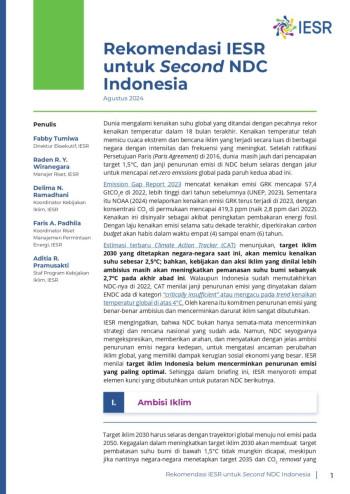The world is experiencing a global temperature rise characterized by record-breaking temperature rises in the last 18 months. Rising temperatures have triggered extreme weather and climate disasters that are occurring widely across countries with increasing intensity and frequency. Following the ratification of the Paris Agreement in 2016, the world is still far from achieving the 1.5°C target, and the emission reduction pledges in the NDCs are not yet aligned with the pathway to achieve global net-zero emissions by the second half of the century.
The Emission Gap Report 2023 notes that GHG emissions rose to 57.4 GtCO2e in 2022, higher than the previous year (UNEP, 2023). Meanwhile, NOAA (2024) reported that GHG emissions continued to rise in 2023, with surface CO2 concentrations reaching 419.3 ppm (up 2.8 ppm from 2022). This increase is allegedly the result of increased burning of fossil energy. With the rate of increase in emissions over the past decade, it is estimated that the carbon budget will be exhausted within four (4) to six (6) years.
The latest Climate Action Tracker (CAT) estimates show that the current 2030 climate targets set by countries will trigger a temperature increase of 2.5°C; even more ambitious climate policies and actions will still warm the planet by 2.7°C by the end of the century. Although Indonesia has updated its NDC in 2022, CAT considers the emission reduction pledges stated in the ENDC to be “critically insufficient” or referring to a global temperature increase trend above 4°C. Therefore, a truly ambitious emission reduction commitment that reflects the climate emergency is urgently needed.
IESR reminds that NDCs should not merely reflect existing national strategies and plans. However, NDCs should express, provide direction, and clearly state the country’s future emission reduction ambitions, to address the threat of global climate change, which has a large socio-economic loss impact. IESR believes that Indonesia’s climate target does not yet reflect the most optimal emission reduction. Therefore, in this briefing, IESR highlights four key elements needed for the next round of NDC.

